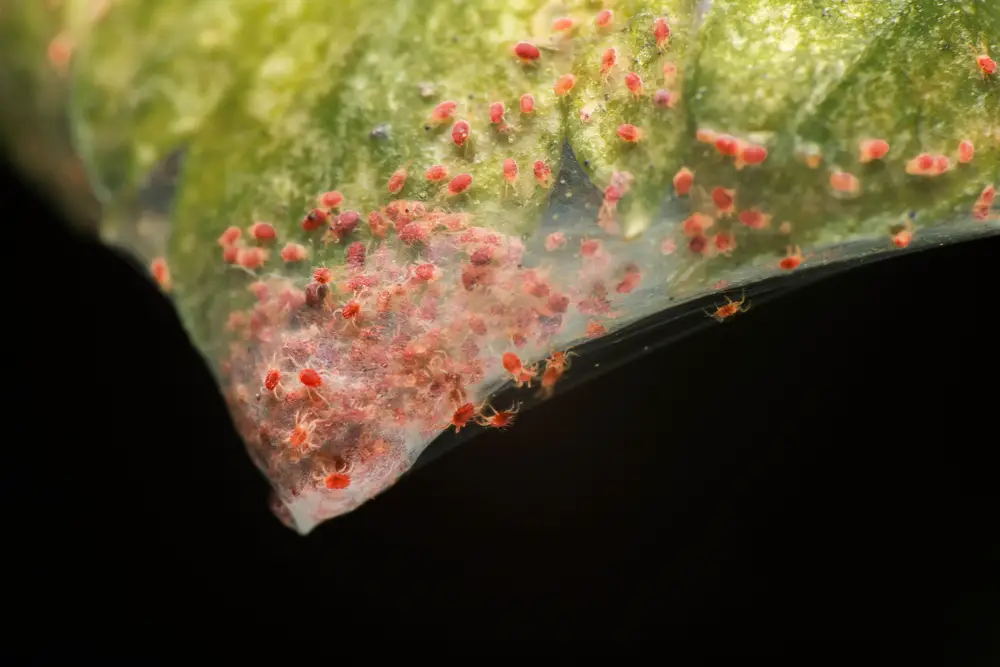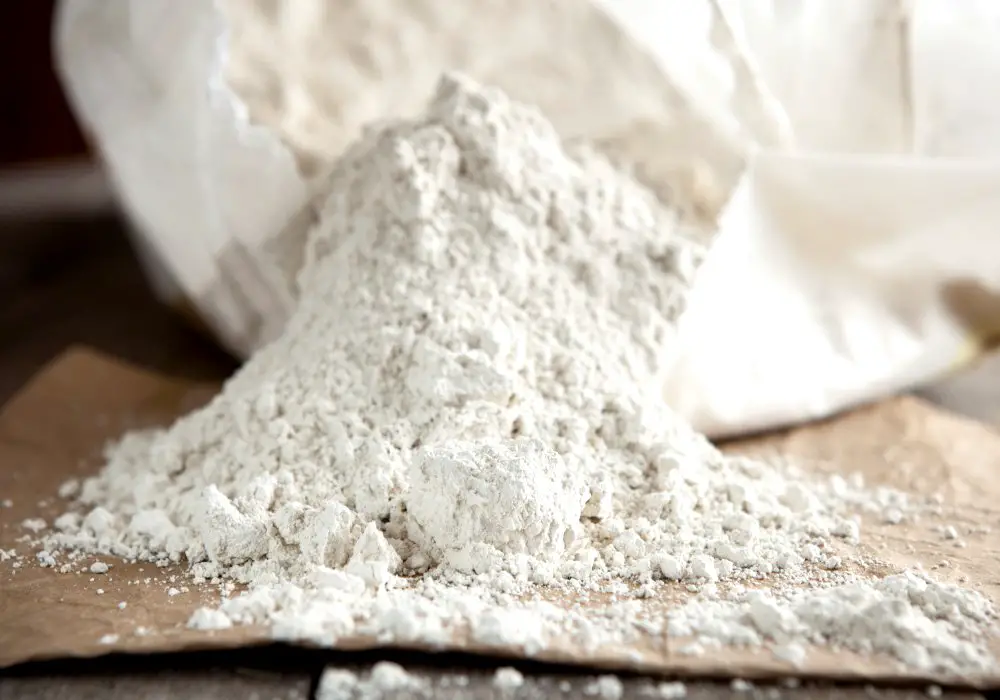Ah, the eternal battle between gardeners and pests: a dance as old as time. Among the many contenders that challenge our patience are the dreaded spider mites, micro-sized menaces that wreak havoc on our cherished plants.
Enter Neem oil, a popular organic solution used by many to fend off a variety of garden pests.
But how effective is it?
More importantly, how long does it take for Neem oil to put an end to a spider mite invasion?
Quick Answer:
Neem oil disrupts spider mites’ feeding and reproduction. A noticeable reduction in mites may take several days post-application. For complete control in heavy infestations, repeat applications at 7-10 day intervals, as adults can be more resilient than younger stages and eggs.
If you’re tired of those tiny web-spinning pests turning your green thumb blue, stay tuned. We’ve got the lowdown on taking down spider mites with the power of Neem!
Understanding Spider Mites and Infestation

Spider mites are tiny arachnids that belong to the Tetranychidae family. They are one of the major garden pests that can cause significant damage to plants.
These mites are known for their ability to reproduce exponentially, which means that a small infestation can quickly turn into a large one if left untreated.
Spider mites thrive in hot and dry conditions, making them a common problem during the summer months. They feed on the sap of plants, which can cause leaves to turn yellow and eventually die.
In severe cases, spider mites can completely defoliate a plant, leading to its death.
One of the biggest challenges with spider mites is that they are difficult to detect. They are so small that they can be easily missed, especially in the early stages of an infestation.
However, some tell-tale signs of spider mite infestation include:
- Webbing on the underside of leaves
- Yellow or brown spots on leaves
- Leaves that are curled or distorted
- Stunted growth of plants
If left untreated, spider mites can quickly spread to other plants in the garden. Therefore, it’s essential to take action as soon as an infestation is detected.
The Power of Neem Oil
Neem oil is a natural insecticide that is derived from the seeds of the neem tree, also known as Azadirachta indica. The active ingredient in neem oil is azadirachtin, which is known for its potent insecticidal properties.
When it comes to spider mites, neem oil has been found to be an effective treatment option. It works by disrupting the mites’ feeding and reproductive cycles, ultimately leading to their demise.
One of the advantages of neem oil is that it is a natural product, which means it is safe for use around humans and pets.
Additionally, neem oil is easy to apply and can be used on a variety of plants, including fruits and vegetables.
However, it’s important to note that neem oil is not an instant solution. It can take several days to a week for the oil to fully take effect and kill the spider mites. Therefore, it’s important to be patient and consistent with your application of the neem oil.
How Neem Oil Works on Spider Mites
Neem oil is a natural insecticide that is extracted from the seeds of the neem tree. It has been used for centuries in traditional medicine and agriculture due to its insecticidal properties.
- 100% Cold Pressed
- Pure Unrefined Neem Oil
- Premium Grade Quality
When used on spider mites, neem oil works by disrupting their hormonal balance, making it difficult for them to reproduce and molt.
Neem oil is a contact insecticide, which means that it needs to come into contact with the spider mites to be effective.
It works by coating the spider mites and suffocating them, causing them to die. Additionally, neem oil contains chemical compounds that are toxic to spider mites, further aiding in their elimination.
One of the benefits of using neem oil is that it is safe for beneficial insects such as bees and ladybugs. It does not harm them or the environment, making it an ideal choice for organic gardening.
When applied correctly, neem oil can kill spider mites and their eggs within a few days. However, it is important to note that neem oil may not be effective against all species of spider mites.
Additionally, repeated applications may be necessary to fully eradicate an infestation.
Application of Neem Oil
When using neem oil to control spider mites, it is important to apply it correctly for the best results.
Here are a few tips on how to apply neem oil effectively:
Spray Application
One common method of applying neem oil is through a spray bottle or sprayer. Fill the container with the appropriate amount of neem oil and water according to the instructions on the label.
Shake well before use and spray the solution onto the affected plants, making sure to cover the undersides of leaves where spider mites often hide.
Foliar Spray
Another method of application is through a foliar spray. This involves spraying the neem oil solution directly onto the leaves of the plant. This method is particularly effective for controlling spider mites on plants with dense foliage.
Soil Soak
For severe infestations, neem oil can also be applied as a soil soak. Dilute the neem oil according to the instructions on the label and pour the solution directly onto the soil around the affected plant.
This method helps to control spider mites that may be hiding in the soil.
Recipe
Here is a simple recipe for making a neem oil solution for spider mite control:
- Mix 2 tablespoons of neem oil with 1 gallon of water
- Add a few drops of dish soap to help the solution stick to the leaves
- Shake well before use
Neem Oil And Other Pests
Neem oil is a popular natural pesticide that is effective against a wide range of pests, including spider mites. However, it is not just spider mites that neem oil can help control. Here are some of the other pests that neem oil can be effective against:
- Ants: Neem oil can disrupt the hormones of ants, making it difficult for them to communicate and coordinate with each other. This can help reduce ant populations in and around your home.
- Insects and bugs: Neem oil can be effective against a wide range of insects and bugs, including thrips, aphids, beetles, squash bugs, whiteflies, mealybugs, and leaf-footed bugs. It works by disrupting the growth and development of these pests, ultimately leading to their demise.
- Powdery mildew: Neem oil can also be effective against powdery mildew, a fungal disease that can affect a wide range of plants. It works by disrupting the growth and reproduction of the fungus, ultimately leading to its demise.
- Castile soap and liquid soap: In addition to neem oil, castile soap and liquid soap can also be effective against a wide range of pests, including leafhoppers, lice, mosquitoes, and stink bugs. They work by suffocating the pests, ultimately leading to their demise.
Neem Oil And Beneficial Insects
Neem oil is a popular organic pesticide used to control spider mites. However, it is important to consider the impact of neem oil on beneficial insects that play a crucial role in maintaining a healthy ecosystem.
Beneficial insects such as pollinators, bees, butterflies, ladybugs, lacewings, and predatory mites are essential for the growth and reproduction of plants.
They help in pollination, pest control, and nutrient cycling. Neem oil, when used inappropriately, can harm these beneficial insects.
Neem oil should not be used when pollinators such as bees and butterflies are active. It is recommended to apply neem oil early in the morning or late in the evening when these insects are less active.
Additionally, neem oil should not be applied to flowering plants as it can harm pollinators.
Ladybugs and lacewings are natural predators of spider mites. Neem oil can harm these beneficial insects if applied directly on them. It is important to use neem oil sparingly and only when necessary to avoid harming these natural predators.
Predatory mites are another beneficial insect that helps in controlling spider mites. Neem oil can harm predatory mites if applied directly on them. It is recommended to avoid using neem oil when predatory mites are present.
Neem Oil And Plants
Neem oil is a natural insecticide that is commonly used to control spider mites on plants.
It is derived from the neem tree and contains compounds that are toxic to spider mites but harmless to most other beneficial insects.
When neem oil is applied to plants, it can take several hours to several days to kill spider mites. The amount of time it takes for neem oil to work depends on several factors, including the severity of the infestation, the type of plant, and the concentration of neem oil used.
Neem oil is most effective when it is applied directly to the spider mites and their eggs. It works by disrupting the mites’ reproductive cycle, preventing them from laying eggs and reproducing.
Neem oil also has a repellent effect, which can help to keep spider mites at bay.
Neem oil can be used on a wide variety of plants, including both indoor and outdoor plants. It is particularly effective on tomatoes, which are often targeted by spider mites. When using neem oil on tomatoes, it is important to apply it to the leaves and foliage, as this is where spider mites are most likely to be found.
Neem Oil And Humans
Neem oil is a natural product that is derived from the seeds of the neem tree. It is widely used as a pesticide and insecticide due to its non-toxic and biodegradable nature.
Neem oil is known to be effective against a wide range of pests, including spider mites.
While neem oil is safe for use on plants and animals, it is important to note that it can cause skin irritation in some humans. Direct contact with neem oil can cause redness, itching, and even blistering.
It is recommended that individuals wear protective clothing, such as gloves and long sleeves when handling neem oil.
Ingesting neem oil can also be harmful to humans. It is important to keep neem oil out of reach of children and pets. If ingested, it can cause vomiting, diarrhea, and even liver damage.
Neem Oil And Pets
Neem oil is a natural insecticide that is commonly used to control spider mites. However, pet owners should exercise caution when using neem oil around their pets.
While neem oil is generally considered safe for use on pets, it can cause adverse reactions in some animals.
Dogs and cats are particularly sensitive to neem oil and may experience vomiting, diarrhea, and other gastrointestinal symptoms if they ingest it. Additionally, neem oil can cause skin irritation and allergic reactions in some pets.
Therefore, it is important to keep neem oil out of reach of pets and to avoid using it on animals with sensitive skin.
If you plan to use neem oil in your garden or around your home, it is recommended that you keep your pets indoors until the oil has dried completely. This will help prevent accidental ingestion or skin contact with the oil.
Additionally, you should always follow the manufacturer’s instructions when using neem oil and avoid applying it in areas where your pets are likely to come into contact with it.
Alternatives to Neem Oil

While neem oil is an effective treatment for spider mites, there are other alternatives available.
Here are some alternatives to neem oil that can be used to control spider mites.
Insecticidal Soap
Insecticidal soap is a natural alternative to chemical pesticides. It works by suffocating spider mites, making it an effective treatment for spider mites.
Insecticidal soap is made from potassium salts of fatty acids and can be used on a variety of plants. It is important to follow the instructions on the label when using insecticidal soap.
Horticultural Oil
Horticultural oil is another natural alternative to chemical pesticides. It works by suffocating spider mites and other pests. Horticultural oil is made from petroleum or vegetable oils and can be used on a variety of plants.
It is important to follow the instructions on the label when using horticultural oil.
Diatomaceous Earth
Diatomaceous earth is a natural substance made from the fossilized remains of diatoms. It works by dehydrating spider mites and other pests.
Diatomaceous earth can be applied to the soil or directly on the plant. It is important to wear protective gear when handling diatomaceous earth.
Natural Remedies
There are many natural remedies that can be used to control spider mites. Some of these remedies include:
- Garlic spray: Mix garlic and water in a blender and strain the mixture. Spray the mixture on the affected plants.
- Peppermint oil: Mix peppermint oil and water in a spray bottle and spray the mixture on the affected plants.
- Rosemary oil: Mix rosemary oil and water in a spray bottle and spray the mixture on the affected plants.
It is important to note that natural remedies may not be as effective as chemical pesticides or neem oil.
It is also important to test any new treatment on a small area of the plant before applying it to the entire plant.
Preventive Measures And Treatment Plan

To prevent spider mites from infesting your garden, it is important to maintain a healthy and clean environment. Regularly inspecting plants for any signs of damage or pests can help catch any issues early on.
Additionally, removing any weeds or debris around the garden can help reduce the likelihood of spider mites finding a home.
If spider mites are already present, there are a few treatment options available. One option is to use a neem oil spray, such as Natria Neem Oil or Verdana Neem Oil.
These sprays work by creating an oily film on the surface of the plant, which can suffocate the mites and their eggs. It is important to apply the spray in the late afternoon or early evening, as neem oil can break down in direct sunlight.
Another treatment option is to use insecticidal soaps, which work by breaking down the mites’ exoskeleton and digestive system. However, it is important to avoid using soaps on plants with high levels of chlorophyll or sap, as this can cause damage to the plant.
When applying any treatment, it is important to follow the instructions carefully and avoid using excessive amounts. It is also important to maintain a consistent temperature and humidity level, as spider mites thrive in hot, dry environments.



